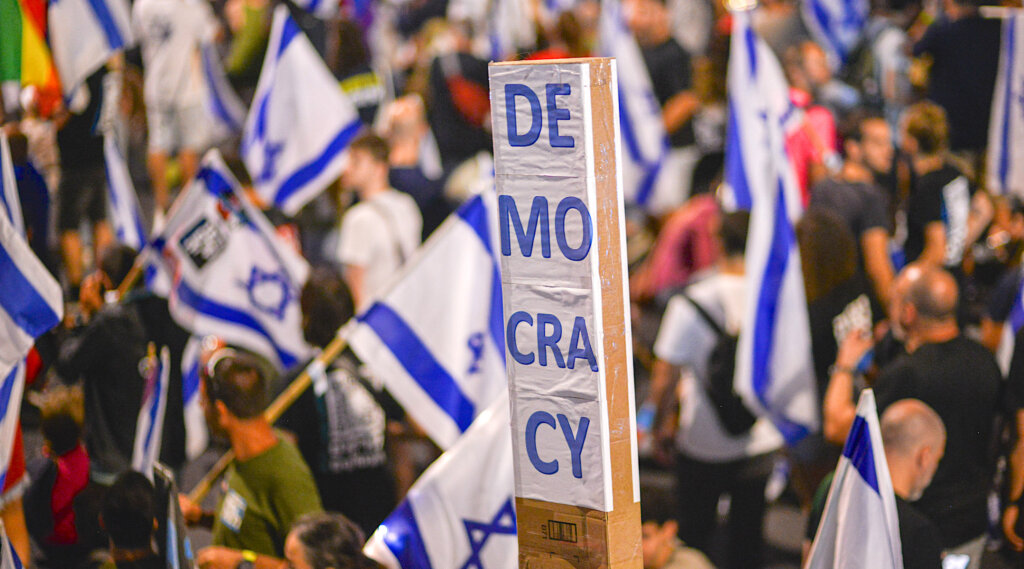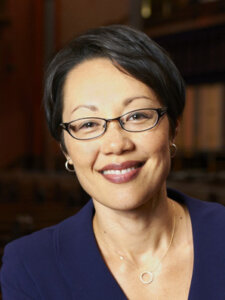Israeli Jews are ‘crying out in pain.’ How will we respond?
If we want to test whether or not the Jewish people are still one body, we must see how one head responds to the suffering of the other.

Graphic by Angelie Zaslavsky
This essay is excerpted from Rabbi Angela Buchdahl’s Erev Rosh Hashanah sermon, delivered at Central Synagogue in Manhattan on Sept. 16, 2023. It has been edited and reprinted with permission.
Thirty years ago this week, Israel’s Prime Minister Yitzchak Rabin and Palestine Liberation Organization President Yassir Arafat signed the Oslo Accords.
I watched sworn enemies shake hands on the White House lawn, and I was sure that peace was just around the corner.
Back then, it was a lot simpler for a young American Jew to call herself a Zionist. Back then, it felt like Jews everywhere agreed that a two-state solution was viable. But by the time I arrived in Israel for rabbinical school, just 20 months later, that optimism was already unraveling.
Jew vs. Jew
I will never forget the November night when I heard that Rabin had been assassinated — at a peace rally! Adding to the shock, his murderer was a fellow Israeli, a religious zealot some called a hero.
We poured onto the streets of Jerusalem, joining dazed and distraught Israelis who held signs that read “Boosha!” — SHAME!
For the first time, I understood that one of the greatest threats to Israel’s survival was the extremism within our own people.
Over the next 30 years, Oslo died, Israel’s left-wing parties disintegrated, peace with Palestinians fell off the agenda and the stain of occupation continued into its sixth decade.
This year, Israel elected the most right-wing, ultra-religious government in its history. It quickly moved to weaken the independence of the judiciary and steamroll the rights of minorities. In a matter of months, this new government has taken actions that threaten to turn Israel into an authoritarian, theocratic state that very few American Jews will be able to support.
What a distance we have traveled in so little time.
Where do we go from here?

Jews make up only two-tenths of a percent of the world’s population— just 15 million souls. Approximately 7 million of us live in Israel. Another 7 million live here in America. Increasingly, these two centers of Jewish life do not understand each other.
Most American Jews see our Judaism as inextricably linked with our ethical values — democracy, egalitarianism and pluralism. When we hear Israel’s government write off Reform Jews as inauthentic, when ministers declare that a Palestinian village deserves to be wiped out, or proudly affirm their homophobia in the name of Judaism, it goes against everything we hold dear.
For most secular Israelis, however, Judaism is inextricable from nationalism, and the very land they live on, serve and protect. When attempts to implement Oslo led to Arab violence and the Second Intifada, Israelis paid the price with their lives.
When Israel withdrew from Gaza in 2005, instead of calm, there was Hamas rule and rocket fire. Israelis couldn’t comprehend how American Jews kept insisting on more withdrawal from territories as a pathway to peace. They saw us as naive, or, even worse, unconcerned for their security and safety.
Our two biggest Jewish communities literally speak different languages. We practice a different Judaism. And the current moment is testing us like never before. The distance between us feels so great we no longer remember what connects us. Does anything still bind Am Yisrael as one?
If we want to test whether or not the Jewish people are still one body, we must see how one head responds to the suffering of the other.
Two heads, one body
This is not a theoretical question right now. The Jews of Israel are crying out in pain. I saw this with my own eyes as I marched with hundreds of thousands of protesters in Tel Aviv and Jerusalem, who have poured onto the streets, week after week, for over 8 months.
They rally against this government while waving Israeli flags, and singing Hatikva, because they protest in the name of their patriotism and their Zionism.
I watched interviews with senior Israeli Air Force reservists who warned of a grave threat to Israel’s security as thousands of Air Force and Army reservists refused to show up for duty as the first judicial overhaul measures passed.
A recent Israeli poll reported that one in four Israelis is considering leaving the country. Even if an exodus of this scale is unlikely, the numbers themselves are a cry for help.
Six months ago, Matti Friedman, Yossi Klein Halevi and Daniel Gordis, Israeli journalists who often interpret and defend Israel’s actions for a mainstream Zionist audience, wrote an unprecedented open letter in The Times of Israel pleading for American Jews to get involved before it’s too late, saying:
“The changes afoot will have dire consequences for the solidarity of Israel’s society.”
“It will do grave damage to our relations with you.”
“This is a moment for alarm.”
There is also real pain on the other side of these protests: Mizrahi Jews who have been treated like second class citizens ever since they arrived, younger voters who came of age in the shadow of the Second Intifada, uprooted settlers from Gaza who never saw the payoff promised for leaving their homes. Their pain showed up at the voting booth and this government has mobilized a coalition of the aggrieved, which threatens to tear Israeli society apart with a force even the government cannot control.
The other half of the Jewish world is in some very hot water. How will we respond to their call?
The Curse of the Eighth Decade
Micah Goodman, an Israeli public intellectual, put this current moment in historical perspective when he related the Curse of the Eighth Decade.
Only two other times in Jewish history did we Jews have sovereignty over ourselves: The first Jewish state established by King David 3000 years ago, and the Hasmonean dynasty of the Second Temple period. In both instances, internal strife in the 8th decade — Jew against Jew — precipitated our downfall and destruction.
We seized a third opportunity for self-determination when the state of Israel was founded in 1948. But do the math. You don’t have to be superstitious to believe that the Curse of the Eighth decade could strike again.
If Israel were no longer to exist — how would you feel? I want you for a moment to imagine it: a world without a Jewish homeland. Really. See how that sits in your heart and soul. It should feel unthinkable and compel us to act.
But I know there are some of you, sadly, who don’t feel compelled. To you, I urge: If you care about democratic rights, help preserve the only functional democracy in the Middle East. If you care about the vulnerable, safeguard the sole sanctuary for Jewish refugees in need. If you value Jewish peoplehood, hear the cries of the other half of our Jewish family and remember: The destiny of Am Yisrael is bound, one to the other.
Listen to Israelis — in order to understand, not to offer solutions. Fund the protesters, NGOs and institutions that are building a more just, democratic, egalitarian and pluralistic Israel. This is not about trying to re-make Israel in our American image, but about helping Israel live up to its own foundational aspirations as stated in its Declaration of Independence.
The last time Israel succumbed to the Curse of the Eighth Decade, we made our final stand atop the desert stronghold of Masada. Those first-century Jews who took their own lives thought this was the very end. And for 2,000 years, it was.
This young, messy, miraculous Jewish state is the most important, sovereign democratic project of the Jewish people of the last 2,000 years. We cannot walk away.
Watch Rabbi Buchdahl’s full speech here:
To contact the author, email [email protected]
















